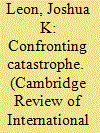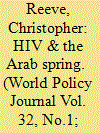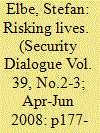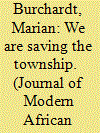|
|
|
Sort Order |
|
|
|
Items / Page
|
|
|
|
|
|
|
| Srl | Item |
| 1 |
ID:
108253


|
|
|
|
|
| Publication |
2011.
|
| Summary/Abstract |
Social environments played a powerful role in the institutional adaptations of the AIDS fighting agencies within the United Nations system. Since its AIDS apparatus has become operational, the UN has undertaken two major strategic shifts. The first shift saw the dissolution of the GPA, a small subunit of the WHO in favour of UNAIDS, a dedicated agency engaged in global advocacy. This shift involved a controversial bureaucratic process that led, finally, to a more human rights-based approach to the disease. The second shift saw an increased emphasis on ground-level efficiency. What caused these changes? Contributions in the rationalist tradition expect the UN to act as a multilateral goal-seeker looking to optimally address a major gap in global governance. A sociological framework sees normative changes within the UN as catalysts for change in its goals and structure. A synthesis of these traditions conceptualizes the UN's strategic shifts more clearly, capturing the interactive process between the organization and its strategic environment. UN agencies were forced to rationally adapt to changing conditions in prevailing AIDS norms.
|
|
|
|
|
|
|
|
|
|
|
|
|
|
|
|
| 2 |
ID:
138556


|
|
|
|
|
| Summary/Abstract |
CAIRO—Mona Iraqi, an outspoken filmmaker turned television presenter, goes in for the kill. She had been staking out a Cairo bathhouse for some time. A hidden camera had recorded enough damning evidence to condemn the place. And now it’s time for action. Iraqi and a cameraman join Egyptian security forces as they raid the hammam. Dozens of bare-chested men, hands covering their faces, are herded out of the place while Iraqi and her crew record the sting operation’s climax for her show, “El-Mestakhabi” (“The Hidden”).
|
|
|
|
|
|
|
|
|
|
|
|
|
|
|
|
| 3 |
ID:
081452


|
|
|
|
|
| Publication |
2008.
|
| Summary/Abstract |
This article analyses the conjunctures of risk and security that have recently emerged in the securitization of HIV/AIDS. Although these partially corroborate Ulrich Beck's notion of risk society, important elements of the securitization of HIV/AIDS resist his understanding of risk as a `danger of modernization'. The article therefore turns to François Ewald's alternative theorization of risk as a `neologism of insurance', and shows that insurance is a risk-based security practice widely used to manage the welfare of populations. Such a biopolitical approach to risk is also valuable for analysing the securitization of HIV/AIDS, which, even though it is unfolding outside the domain of insurance, similarly draws upon multiple risk categories (`security risks', `risk groups' and `risk factors') in efforts to improve the collective health of populations. Analysed through a wider concept of risk as a `biopolitical rationality', the conjuncture of risk and security in the securitization of HIV/AIDS thus emerges as a principal site where the institutions of sovereign power in international relations are being absorbed and integrated within a wider biopolitical economy of power.
|
|
|
|
|
|
|
|
|
|
|
|
|
|
|
|
| 4 |
ID:
108959


|
|
|
|
|
| Publication |
2011.
|
| Summary/Abstract |
Leadership is one of the central explanatory factors for change within international organizations yet is often sidelined as a part of wider social processes or understood in the context of domestic and managerial political agency. This article adopts one of the few understandings of leadership within international organization-Robert Cox's 1969 essay on the executive head-as an analytical model for understanding leadership within global HIV/AIDS governance. It does so by applying Cox's framework of analyzing the role of the executive head in relation to the international bureaucracy, member states, and the international system to the position of the former executive director of the Joint United Nations Programme on HIV/AIDS (UNAIDS), Peter Piot. The article argues that the role of leadership transcends the agency of simply opening up the black box of international organizations and is a realm of political knowledge and agenda-setting that is integral to the formation and subsequent longevity of international institutions, alliances, and the global issues that justify their existence.
|
|
|
|
|
|
|
|
|
|
|
|
|
|
|
|
| 5 |
ID:
124260


|
|
|
|
|
| Publication |
2013.
|
| Summary/Abstract |
In this article, I trace the emergence of Pentecostal FBOs in the South African city of Cape Town. By focusing on their involvements in HIV/AIDS programmes, including practices such as health education, counselling and material support, I analyse the organisational dynamics and consequences ensuing from their activities. Pentecostal involvements in development work engender complex connections between two distinct processes: On the one hand, they offer Pentecostal communities new social spaces for promoting their faith and moral agendas. On the other hand, development work urges Pentecostal communities to recast their activities in the logic of formal organisation and accountability (proposals-grants-projects). On the ground, these logics are constantly subverted as beneficiaries construe FBOs as patrons and deploy Pentecostal identities for mediating access to FBOs and the resources they command. My argument is that Pentecostal faith works to mediate the entire set of social relationships, expectations, imageries and practices that structure FBO work on the ground. More than belief and ritual, it is Pentecostal belonging that links organisations, people, opportunities and resources.
|
|
|
|
|
|
|
|
|
|
|
|
|
|
|
|
|
|
|
|
|